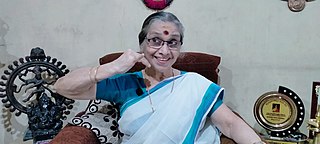
Perumanoor Gopinathan Pillai, more popularly known as Guru Gopinath was a well known Indian actor-cum-dancer. He is well regarded as the greatest preserver of the dance tradition. He is a recipient of the Sangeet Natak Akademi Award, the Kerala Sangeetha Nataka Akademi Fellowship, and the Kerala Sangeetha Nataka Akademi Award.

Vadakke Manalath Govindan Nair popularly known as Kalamandalam Gopi, is an Indian dancer who is an exponent of the classical dance-drama style known as Kathakali.

Kanak Rele was an Indian dancer, choreographer, and academic best known as an exponent of Mohiniyattam. She was the founder-director of the Nalanda Dance Research Centre and the founder-principal of the Nalanda Nritya Kala Mahavidyalaya in Mumbai.

Sunanda Nair is an Indian dancer trained in Mohiniattam. She did her master's degree in this dance form from Nalanda Nritya Kala Mahavidyalaya affiliated to the University of Mumbai. She has completed her PhD from University of Mumbai for her thesis "Intrinsic Lyrical Feminism in Mohiniattam". She was born in Mumbai, India.
Keezhpadam Kumaran Nair (1916–2007) was a Kathakali artist from Kerala, India. Endowed and equipped with a life profile that also showed him to several traditional Indian performing arts other than Kathakali, his stage presentation infused a fresh breath into the four-century-old art form, thanks also to his broad and deep view about the Puranas that spurred from a constant pursuit of knowledge through reading books and engaging in talks with scholars.

Kalamandalam Kallyanikutty Amma was an epoch-making Mohiniyattam danseuse from Kerala in southern India. A native of Thirunavaya in Malappuram district of the state, she was instrumental in resurrecting Mohiniyattam from a dismal, near-extinct state into a mainstream Indian classical dance, rendering it formal structure and ornamentation.

Kalamandalam Padmanabhan Nair (1928–2007) was an eminent Kathakali exponent, equally known for his capacities as a tutor, theoretician and author of a few authentic texts on the classical dance-drama from Kerala in south India. A son of the Kathakali guru Pattikkamthodi Ravunni Menon, Padmanabhan Nair was one of the early-batch students in Kerala Kalamandalam, where he subsequently joined as a teacher and retired as its principal in 1990. He died on 3 April 2007, at his home in Shoranur, near his alma mater, where he led his post-professorial life with wife and Mohiniyattam exponent and guru, Kalamandalam Satyabhama.

Kalamandalam Vasu Pisharody was an Indian Kathakali actor known for his classical dance-drama of Kerala. A frontline disciple of Padma Shri Vazhenkada Kunchu Nair, he exceled in virtuous pachcha, anti-hero Kathi and the semi-realistic minukku roles alike. Nalan, Bahukan, Arjunan, Bhiman, Dharmaputrar, Rugmangadan, Narakaasuran, Ravanan, Parashuraman and Brahmanan were his masterpieces. Vasu Pisharody performed Kathakali all over India and visited foreign countries about 20 times.
Sadanam K. Harikumaran is a versatile artiste from Kerala in south India, known for his engagements with Indian classical dances and music, besides painting, sculpting and literature.

Smitha Rajan is an Indian Mohiniyattam performer from Kerala and granddaughter of the Indian classical dancers Padma Shri Kalamandalam Krishnan Nair and Kalamandalam Kalyanikutty Amma.
Vimala Menon, known popularly as Kalamandalam Vimala Menon is an Indian dance teacher and Mohiniyattam exponent from Kerala. She is the founder and Director of Kerala Natya Academy in Thiruvananthapuram.
Kalamandalam Sivan Namboodiri is an Indian classical theatre performer, the first person from outside chakyar community to practice Koodiyattam, from Kerala. He was awarded the Padma Shri, in 2012, for his contributions to the art of Koodiyattam, by the Government of India.
Bharati Shivaji is an Indian classical dancer of Mohiniyattom, choreographer and author, known for her contributions to the art form by way of performance, research and propagation. She is the founder of Center for Mohiniyattam, a dance academy promoting Mohiniyattom and the co-author of two books, Art of Mohiniyattom and Mohiniyattom. She is a recipient of the Sangeet Natak Akademi Award and Sahitya Kala Parishad Samman. The Government of India awarded her the fourth highest civilian honour of the Padma Shri, in 2004, for her contributions to Indian classical dance.

Kalamandalam Radhika is an Indian classical dancer, choreographer, research scholar, teacher, writer and philanthropist. She was the first non-resident Keralite to win the Kerala Sangeetha Nataka Akademi Award for Mohiniyattom. She learnt Kuchipudi, Bharatanatyam, Kathakali and other dance forms.

Chemancheri Kunhiraman Nair, also known as Guru Chemancheri was an Indian Kathakali actor. He spent over eighty years learning and teaching and performing Kathakali, a major form of classical Indian dance. The Government of India awarded him the fourth highest civilian honour, Padma Shri in 2017.

Kala Vijayan is an Indian classical dance performer, choreographer, author and actor. She is the daughter of the legendary Kathakali artist Kalamandalam Krishnan Nair and Mohiniyattam exponent Kalamandalam Kalyanikutty Amma. Kala Vijayan is trained in Mohiniyattam, Bharatanatyam and Kathakali, however she is best known for her contributions to Mohiniyattam. She is the recipient of Kerala Sangeetha Nataka Akademi Award for Mohiniyattam (1998) and the Kerala State Award for Mohiniyattam (2019). She is the Principal Director and senior Guru at Kerala Kalalayam, a fine arts institute established by her parents at Thripunithura in 1952.

Gopika Varma is a Kerala born Mohiniyattam dancer and dance teacher who is settled in Chennai, Tamil Nadu, India. She received several awards including Sangeet Natak Akademi Award, Kerala Sangeetha Nataka Akademi Award and Kalaimamani.
Kalamandalam Sugandhi is a Mohiniyattam dancer, choreographer and dance teacher from Kerala, India. She received several awards including Sangeet Natak Akademi Award, Kerala Sangeetha Nataka Akademi Award, Kerala Sangeetha Nataka Akademi Fellowship, Kerala Konkani Sahitya Academy Award and Kerala Kalamandalam Award.
V. K. Hymavathy popularly known as Kalamandalam Hymavathy is a Mohiniyattam dancer and dance teacher from Kerala, India. She received several awards including Sangeet Natak Akademi Award, Kerala Sangeetha Nataka Akademi Gurupooja Award and Kerala Sangeetha Nataka Akademi Award.
Kalamandalam Saraswathi is an Indian classical dancer from Kerala. She has mastered dance forms like Mohiniyattam, Bharatanatyam and Kuchupudi. Saraswathi is a recipient of the Kerala Sangeetha Nataka Akademi Award in 1983 for Bharatanatyam. She is the wife of renowned Malayalam writer M. T. Vasudevan Nair.












